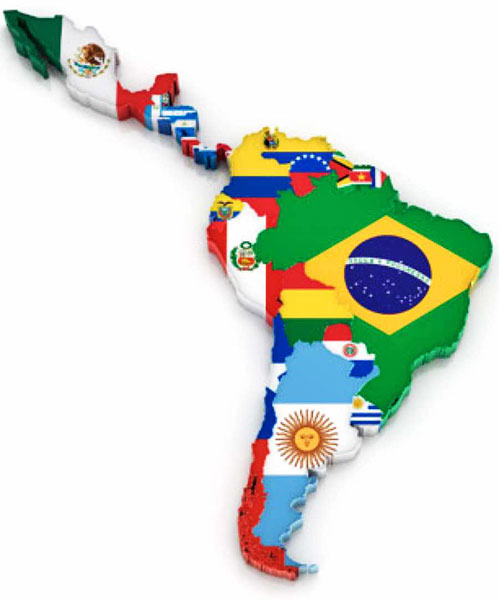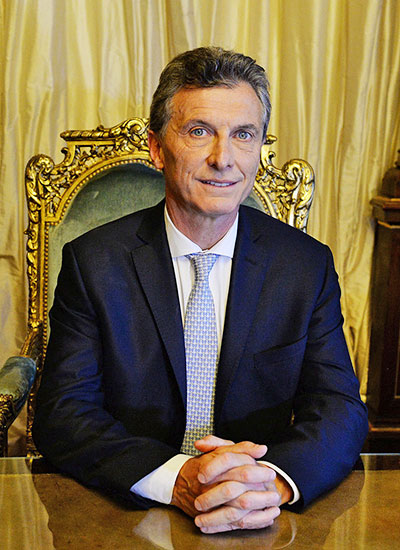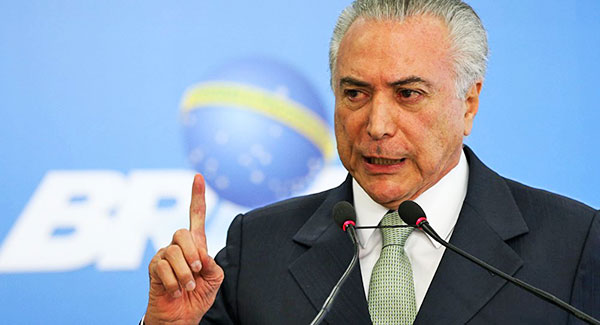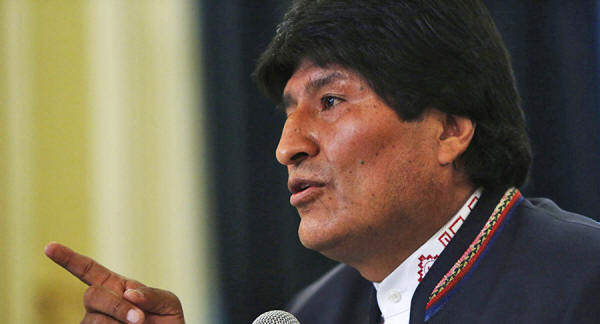|
Numerous questions arise.
While the left has been in retreat, they still retain power in some states.
Numerous questions arise.
We will proceed by discussing the character and policies of the right and left and their direction.
We will conclude by
analyzing the dynamics of right and left policies, alignments and
future perspectives.
Radical right regimes rule in,
In several countries
extreme right regimes have made abrupt changes, while in others they
build on incremental changes constituted over time.
The goal is to redistribute income upwardly, to re-concentrate wealth, property-ownership upward and externally and to subscribe to imperial doctrine.
These pluto-populist
regimes are run by rulers, who openly speak to and for very powerful
domestic and overseas investors and are generous in their
distribution of subsidies and state resources - a kind of 'populism
for
the plutocrats'.
(Source: Wikimedia Commons)
Wall Street speculators
and Washington's overseas political apparatus subsidized his
electoral campaign.
Macri organized a political purge and arrest of opposition political leaders, including former President Cristina Fernandez de Kirchner.
Several provincial activists were jailed or even assassinated. Macri is a success story from the perspective of Wall Street, Washington and the Porteño business elite.
From the perspective of Argentina's small and medium business enterprises President Macri's regime has been a disaster:
Many thousands have gone
bankrupt because of high utility costs and harsh competition from
cheap Chinese imports. In addition to the drop in wages and
salaries, unemployment and under employment doubled and the rate of
extreme poverty tripled
The promise of prosperity was narrowly based around a quarter of the population.
To weaken the expected
public discontent - the regime shut down independent media voices,
unleashed thugs against critics and co-opted pliable gangster trade
union bosses to break strikes.
Macri is prepared to sign off on,
Temer led over a thousand
bribe-taking elected officials in the multi-billion dollar pillage
of the state oil company and every major public infrastructure
project.
Despite 95% public disapproval, President Temer remains in power with the total backing of,
Mexico, the long-standing narco-assassin state, continues elect one thieving PRI-PAN political regime after another.
Billions in illicit profits flows to the overseas tax havens of money laundering bankers, US and Canadian mine owners. Mexican and international manufacturers extracted double digit profits sent, to overseas accounts and tax havens.
Mexico broke its own miserable record in elite tax avoidance, while extending low wage-tax 'free trade zones'.
Millions of Mexicans have
fled across the border to escape predatory gangster capitalism. The
flow of hundreds of millions of dollars of profits by US and
Canadian multi-nationals were a result of the 'unequal exchange'
between US capital and Mexican labor, held in place by Mexico's
fraudulent electoral system.
What is consistent in
Peruvian politics is the handover of mineral resources to foreign
capital, pervasive corruption and the brutal exploitation of natural
resources by US and Canadian mining and drilling corporations in
regions inhabited by Indian communities.
Narco-presidents now wield power by means of repression, including violence against popular movements and the killing of scores of peasant and urban activists.
This year, a grossly
rigged election in Honduras ensured the continuity of narco-regimes
and US military bases.
At most the far right
allows a few rotating elites with nationalist pretensions to provide
a façade of electoral democracy.
In both cases the groundwork was established via accommodations with oligarchs of the traditional right parties.
The previous center-left regimes of Ecuadorean President Rafael Correa and Uruguayan President Jose Mujica succeeded in pushing for public investments and social reforms.
They combined their leftist rhetoric while capitalizing on the global high prices and high demand for agro-mineral exports to finance their reforms. With the decline in world prices and the public exposure of corruption, the newly elected center-left parties nominated and elected center-right candidates who turned anti-corruption campaigns into vehicles for embracing neoliberal economic policies.
The center-right
presidents rejected economic nationalism, encouraged large scale
foreign investment and implemented fiscal austerity programs
appealing to the upper middle class and ruling class.
In the case of Ecuador,
they split the party, with the newly elected president realigning
international policies away from the left (Bolivia, Venezuela) and
toward the US and the far right - while shedding the legacy of their
predecessor in terms of popular social programs.
While Bolivia condemns US imperialism, major oil, gas, metals and lithium multi-nationals have invested heavily in Bolivia.
Evo Morales has moderated
his ideological posture shifting from revolutionary socialism
to a local version of liberal democratic cultural politics.
Evo Morales' embrace of a mixed economy has neutralized any overt
hostility from the US and the new far-right regimes in the region.
President Evo Morales's,
...has led to political
stability and social continuity despite the volatility of commodity
prices.
Totally dependent on
extraordinary global oil prices, Venezuela proceeded to finance
generous welfare programs at home and abroad. Under President Chavez
leadership, Venezuela adopted a consequential anti-imperialist
policy successfully opposing a US centered free trade agreement (LAFTA)
and launching an anti-imperialist alternative, the Bolivarian
Alliance for the Americas (ALBA).
Unlike Bolivia under President Evo Morales, who built his power with the support of an organized, class conscious and disciplined mass base, Venezuela counted on an amorphous electoral alliance, which included slum dwellers, defectors from the corrupt traditional parties (across the spectrum) and opportunists intent on grabbing office and perks.
Political education was
reduced to mouthing slogans, cheering the President and distributing
consumer goods.
Corruption was rampant and billions of dollars of oil wealth was stolen.
This pillage was tolerated because of the huge influx of petro-dollars due to historic high prices and high demand.
This led to a bizarre situation where the regime spoke of socialism and funded massive social programs, while the,
...were controlled by hostile private oligarchs who pocketed enormous profits while manufacturing shortages and promoting inflation.
Despite the problems, the
Venezuelan voters gave the regime a series of electoral victories
over the US proxies and oligarch politicians. This tended to create
overconfidence in the regime that the Bolivarian socialist model was
irrevocable.
Unlike Bolivia, foreign reserves declined, the rampant theft of billions was belatedly uncovered and the US-backed rightwing opposition returned to violent 'direct action' and sabotage while hoarding essential food, consumer goods and medicine.
Shortages led to widespread black marketeering.
Public sector corruption and hostile opposition control of the private banking, retail and industrial sectors, backed by the US, paralyzed the economy.
The economy has been in a free-fall and electoral support has eroded.
Despite the regime's
severe problems, the majority of low income voters correctly
understood that their chances of surviving under the US-backed
oligarchic opposition would be worse and the embattled left
continued to win gubernatorial and municipal elections up through
2017.
The Santa Cruz-based oligarchs faced the clear choice of either sharing profits and social stability by signing off on social pacts (workers/peasants, capital and state) with the Morales government or facing an alliance of the government and the militant labor movement prepared to expropriate their holdings.
The elites chose economic
collaboration while pursuing low intensity electoral opposition.
Opposition to the extreme right is likely to grow, given the harsh, uncompromising assault on,
The extreme right has several options, none of which offer any concessions to the left.
The formerly
revolutionary left parties, movements and leaders have evolved
toward electoral politics, protests and job action. So far they do
not represent an effective political option at the national level
Unless the center-left
reformers engage in prolonged large-scale mass activity, the far
right will effectively undermine their political recovery.
The US military program
has effectively neutralized the radical opposition in Colombia, and
the Trump regime has intensified and imposed new
sanctions on Venezuela and Cuba.
However large outflows of profits, major transfers of ownership to foreign investors, favorable tax rates, low tariff and trade policies have yet to generate new productive facilities, sustainable growth and to ensure economic fundamentals.
Maximizing profits and ignoring investments in productivity and innovation to promote domestic markets and demand has bankrupted tens of thousands of medium and small local commercial and manufacturing firms.
This has led to rising chronic unemployment and underemployment. Marginalization and social polarization without political leadership is growing.
Such conditions led to 'spontaneous' uprisings in,
The far right in power may not evoke a rebellion of the far left but its policies can certainly undermine the stability and continuity of the current regimes.
At a minimum, it can lead
to some version of the center left and restoration of the welfare
and employment regimes now in tatters.
|





